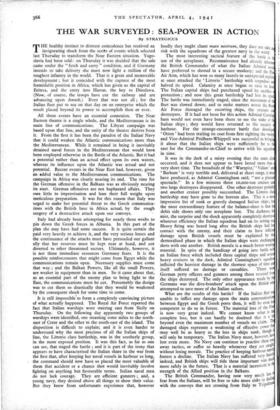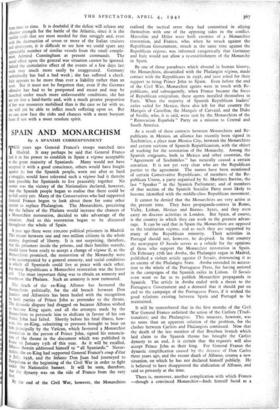THE WAR SURVEYED : SEA-POWER IN ACTION
By S TRATEG ICUS
THE healthy instinct to distrust coincidence has received an invigorating shock from the series of events which selected last Thursday to transform the Near Eastern situation. Yugo- slavia had been sold: on Thursday it was decided that the sale came under the " fetch and carry " condition, and if Germany intends to take delivery she must now fight a million of the toughest infantry in the world. That is a great and memorable development ; but it coincided with the capture of the most formidable position in Africa, which has given us the capital of Eritrea, and the entry into Harrar, the key to Diredawa. (Now, of course, the troops have cut the railway and are advancing upon Awash.) Even that was not all ; for the Italian fleet put to sea on that day on an enterprise which the result placed beyond its power to accomplish then or ever.
All these events have an essential connexion. The Near Eastern theatre is a single whole, and the Mediterranean is its main line of communications. The Libyan campaign was based upon that line, and the unity of the theatre derives from it. From the first it has been the paradox of the Italian' Navy that it could weaken the Atlantic communications more than the Mediterranean. While it remained in being it inevitably detained naval forces in the Mediterranean that would have been employed otherwise in the Battle of the Atlantic. But it had a potential rather than an actual effect upon its own waters, whereas its influence upon the Atlantic was actual and not potential. Recent events in the Near East had, however, given an added value to the Mediterranean communications. The campaign in Africa was clearly nearing its end. The time for the German offensive in the Balkans was as obviously nearing its start. German offensives are not haphazard affairs. They owe little to improvisation and lean their full weight upon meticulous preparation. It was for this reason that Italy was urged to make her potential threat to the Greek communica- tions with the British base in Africa actual, by the rough surgery of a destructive attack upon our convoys.
Italy had already been attempting for nearly three weeks to pin down the Greek forces in Albania. In this part of the plan she may have had some success. It is quite certain she paid very heavily to achieve it, and the very serious losses and the continuance of the attacks must have persuaded our gallant ally that her reserves must be kept near at hand, and not diverted to other threatened sectors. Ultimately, however, it is not these immediate resources Germany fears. It is the possible reinforcements that might come from Egypt while the communications remain open. Necessary supplies must come that way ; and the Balkan Powers, like all the small Powers, are weaker in equipment than in men. So it came about that, as an essential part of the enemy plan to bring light to the East, the communications must be cut. Presumably the design was to cut them so drastically that they would be weakened by the consequent shock for some time to come.
It is still impossible to form a completely convincing picture of what actually happened. The Royal Air Force reported the fact that Italian warships were steering east from Sicily on Thursday. On the following day apparently two groups of warships were identified, one steaming some miles to the north- east of Crete and the other to the south-east of the island. The disposition is difficult to explain; and it is even harder to understand why the most precious of all the Italian ships of line, the Littorio class battleship, was in the southerly group, in the more exposed position. It was this fact, as far as one can see, that staged the battle ; and it is part of the irony that appears to have characterised the Italian share in the war from the first that, after keeping her naval vessels in harbour so long, the command should now have so placed the most valuable of them that accident or a chance shot would inevitably involve fighting on anything but favourable terms. Italian naval men do not lack courage. They are efficient gunners ; and, a young navy, they desired above all things to show their value. But they knew from unfortunate experience that, however loudly they might chant mare nostrum, they dare not take risk with the squadrons of the greatest navy in the world. The most interesting tactical feature of the battle is use of the aeroplanes. Reconnaissance had already info the British Commander of what the Italian Admiral we, have preferred to shroud in a secure modesty; and the Fl. Air Arm, which has won so many laurels in unexpected explei at once attacked the Littorio ' battleship with torpedoes a halved its speed. Calamity at once began to raise its hea The Italian capital ships had purchased speed by sacrifice protection ; and now this great battleship had lost its spe The battle was immediately staged, since the movement of , fleet was slowed down; and to make matters worse the Roy Air Force damaged the escorting ships, the cruisers an destroyers. If it had not been for this action Admiral Cunning ham would not even have been there to see the wake of Italian ships ; they would have returned to the security harbour. For the strange-encounter battle that develo ' Orion' had been trailing its coat from first sighting the ,rieriav and Vice-Admiral Pridham-Whippell was successful in bringing it about that the Italian ships were sufficiently far to thi east for the Commander-in-Chief to arrive with his squadron in time.
It was in the dark of a misty evening that the main clasl occurred, and it does not appear to have lasted more than very short time. The broadside of the Warspite," Valiant' an: ' Barham' is very terrible and, delivered at short range, it roes have produced, as Admiral Cunningham said, " not a pleasan spectacle." In a few minutes three to,000-ton cruisers ant two large destroyers disappeared. One other destroyer probabll and another cruiser possibly succumbed. The Littorio clan battleship may have gone to the bottom also. This is a inns impressive list of sunk or gravely damaged Italian ships ; be the most extraordinary feature of the balance-sheet is that thi debit side shows only one aeroplane lost. The darkness. the mist, the surprise and the shock apparently completely destroye1 whatever efficiency the Italian squadron had on its setting out Heavy firing was heard long after the British ships had IN contact with the enemy, and their claim to have inflicter damage upon British vessels must be explained by the demoralised phase in which the Italian ships were exchanging shots with one another. British morale is a much better wearin material. In spite of the handicap of going into battle with an Italian force which included three capital ships and seven heavy cruisers in the dark, Admiral Cunningham's squadron inflicted the heaviest damage in the shortest space of time anc itself suffered no damage or casualties. There We German petty officers and gunners among those rescued fren the ships destroyed. The only other appearance made by Germans was the dive-bombers' attack upon the British WI' attempted to save more of the Italian sailors. What are the results of this battle? If the Italian fleet.' unable to inflict any damage upon the main communican between Egypt and the Greek ports then, it will be even 1 competent to do so in future. The material loss of the Fl. is now very great indeed. We cannot know what is ,• complete loss, but it can hardly be doubted that it is beyond even the maximum number of vessels we claim. 111' damaged ships represent a weakening of effective power tha. may well be as heavy as the loss in ships sunk, though I will only be temporary. The Italian Navy must, however, ha lost even more. No Navy can continue to practise these " away tactics, or suffer so heavily whenever they are caugla without losing morale. The practice of keeping harbour roe fosters a decline. The Italian Navy has suffered very hea indeed, and British ships will ride these important seas ma more safely in the future. That is a material increment to '' strength of the Allied position in the Balkans. The British Commander, having now very much leas,: fear from the -Italians, will be free to take more risks in with the convoys that are crossing from Italy to Tripoli' from time to time. It is doubtful if the defeat will release any effective strength for the battle of the Atlantic, since it is the smaller craft that are most needed for that struggle and, even with the destruction of seven or more of the Italian cruisers and destroyers, it is difficult to see how we could spare any appreciable number of similar vessels from the small comple- ment Admiral Cunningham at present commands. The moral effect upon the general war situation cannot be ignored. Indeed the cumulative effect of the events of a few days last week may much more easily be exaggerated. Germany undoubtedly has had a bad week ; she has suffered a check. Italy appears to be more than ever a liability rather than an asset. But it must not be forgotten that, even if the German offensive has had to be postponed and recast and may be launched under much more unfavourable conditions, she has not yet lost a land-battle and, with a much greater proportion of her war resources mobilised than is the case so far with us, she will yet be able to inflict much suffering upon us. But we can now face the risks and chances with a more buoyant heart if not with a more resolute spirit.



























 Previous page
Previous page